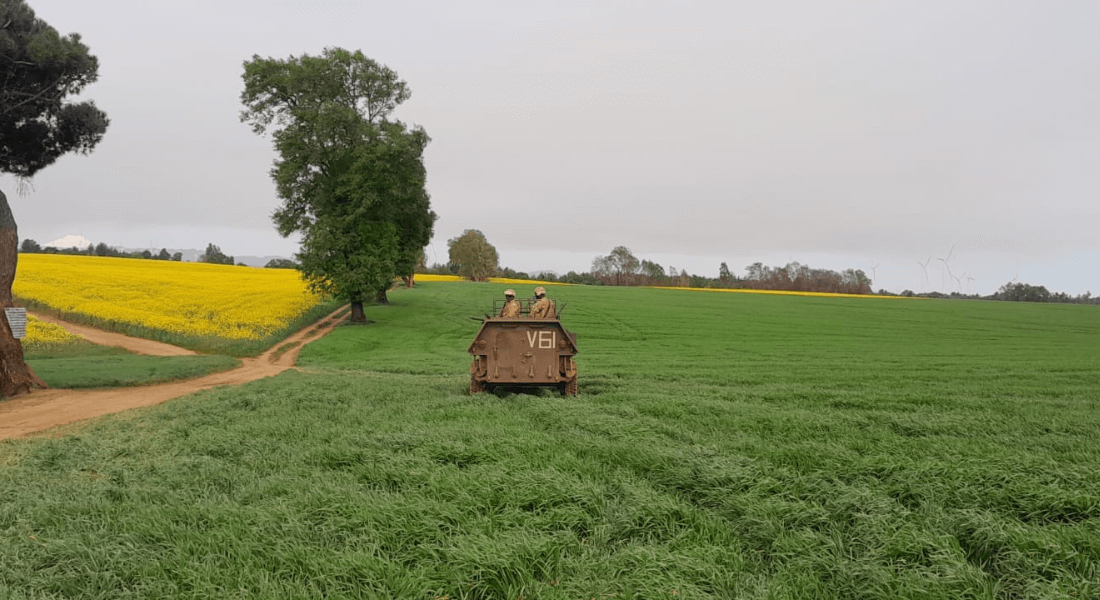
PhD defence: Coding the Circuit of Capital: Wind power, violence and the work of law in Wallmapu

PhD defence (hybrid)
Maria Cariola Eriksson
Title of thesis
Coding the Circuit of Capital: Wind power, violence and the work of law in Wallmapu
Abstract
This thesis examines the recent expansion of wind energy projects into Mapuche lands in the province of Malleco in the South of Chile. It shows that when wind energy arrives on these lands, it reinforces existing property relations and the land tenure of large landowners and forestry companies, and increases the criminalization of competing land claims by Mapuche groups. It argues that this is possible because of the legal work that multinational energy companies undertake to legalize their operations.
Methodologically, the thesis is based on twelve months of multifaceted ethnographic fieldwork in Chile, between the capital Santiago de Chile and Collipulli, a community in the heart of Wallmapu, the Mapuche ancestral territory. It follows two specific wind farm projects, the San Andrés Wind Farm and the Malleco Wind Farm, at different stages of development. The author used a strategy of investigative ethnography, combining research in notaries' archives with interviews and participant observation.
Conceptually, this thesis considers how law facilitates the circulation of capital, combining Marxist work on the circulation of capital with an institutionalist attention to capital as legally coded through private legal instruments. It shows that for the process of profit maximization and investment to take place, corporations encode exchange relations for extended periods into the future, effectively locking in property relations and giving them priority over competing, democratizing concerns.
Chapter one argues that property in Malleco is conditioned by histories of colonial and dictatorial dispossession that are cemented with the arrival of wind energy. Chapters two through four detail the process of legal coding of rights for green capital. Chapter two interrogates the politics of legal personhood through which corporations and financiers legalize their operations. This chapter argues that to understand what an energy project is from a legal perspective, it is useful to think of it as a bundle of property rights that are made transferable to distant actors through law. In chapter three, by following the coding of new land rights for the arrival of wind energy, which are contingent on the maintenance of the land tenancy of large landowners. In chapter four, by asking how power purchase agreements enable the circulation of electricity as a commodity. Taken together, these three chapters show that in order for energy companies to raise capital to build wind farms, they engage in a legal coding of the future that cements social relations over land and electrical infrastructure for decades into the future.
Chapters five and six both question the enforcement of contracts and the relationship between the political and the economic. Chapter five describes the public and private security arrangements that were put in place to secure the construction site of the Malleco wind farm. It shows that legal certainty for investors translated into a mobilization of the state's capacity for security, i.e. the suspension of its own rules. Chapter six asks how corporations mobilize legality to manage responsibility for the externalities of their operations. It does so by asking how two different deaths on the roads outside the wind farm are constructed as events. It argues that the legal nature of the corporation makes it possible for the corporation to manage its externalities.
Taken together, this thesis draws attention to the tensions between the goals of the inherently future-oriented politics of energy transitions and the futures that are legally sanctioned by corporations and investors in the private contracts of energy companies. It argues that the latter forecloses democratic politics by cementing property relations far into the future.
Organiser:
Department of Food and Resource Economics (IFRO), University of Copenhagen
Supervisor:
Associate Professor Mattias Borg Rasmussen, Department of Food and Resource Economics (IFRO), University of Copenhagen
Co-supervisor:
Professor Christian Lund, Department of Food and Resource Economics (IFRO), University of Copenhagen
Assessment Committee:
Chair:
Professor Jens Friis Lund, Department of Food and Resource Economics, University of Copenhagen
Professor Kristina Dietz, University of Kassel, Germany
Professor Suzana Sawyer, Department of Anthropology, University of California, Davis
Master of Ceremony
Associate Professor Mariève Pouliot, Department of Food and Resource Economics, University of Copenhagen
The defence is open to all.
Yes. Please contact Maria Cariola Eriksson maca@ifro.ku.dk 3 June - 22:00 (CET) at the latest to receive link and passcode for online hybrid zoom participation.
Yes. If you are interested in a full copy of the thesis, please contact the PhD student or the PhD Secretary milton@ifro.ku.dk
No. The doors close when the defence starts and will not be opened again until the defence is finished.
You cannot leave early either unless there is an emergency.
It is not allowed to take pictures or record the defence without prior agreement with the PhD student and supervisors.
There is usually a reception after a defence. We kindly ask you to contact the PhD student if you want to know the location of the reception.
Events


